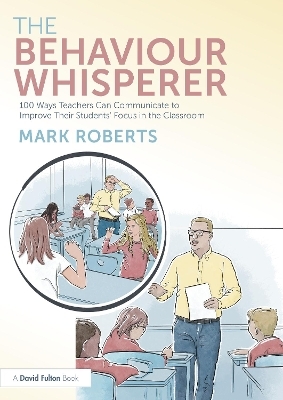
The Behaviour Whisperer
Routledge (Verlag)
978-1-032-57752-4 (ISBN)
Dealing with poor behaviour is exhausting and stressful. But it doesn’t have to be! Some teachers keep their students in line with apparent ease. They defuse tricky situations with discreet words and almost imperceptible gestures. They extract work from the most reticent students. Yet even experienced teachers are not immune to the impact of bad behaviour on both the classroom environment and their own well-being. In this exciting new book, bestselling author Mark Roberts shares the secrets of how behaviour whispering can improve 100 common classroom problems, from the student who is always late to the class that is unsettled by a wasp.
Divided into two sections, Part A features 80 common behaviour scenarios that teachers are likely to encounter. Roberts reframes ineffective responses to these scenarios by using language that helps students feel supported, and helps you succeed in regaining control of the situation. Part B introduces 20 non-verbal forms of communication that can be used in a variety of behaviour situations to manage the problem without singling out a troublesome or unfocused student. Each of the 100 scenarios featured in the book is accompanied by an illustration and an explanation of why this phrase or gesture works. Practical next steps follow at the end of every scenario, giving further suggestions on how to maintain good behaviour.
Providing unrivalled insight into the importance of communication and the psychology that underpins it, the book breaks behaviour down to a granular level, offering tried and trusted responses to virtually every conceivable classroom behaviour scenario at primary and secondary levels.
Mark Roberts is Director of Research at a Carrickfergus Grammar School in Northern Ireland. Previously, he has worked at schools in Devon and Manchester. Mark writes books and articles about teaching and studying English and is also a frequent contributor to TES on subjects including pedagogy, behaviour, leadership and educational research.
Part A: What can I say? 1. The student who keeps turning up late 2. The student who keeps shouting out 3. The student with their head on the desk 4. The class that uses unkind “banter” 5. The student who is a persistent pen tapper 6. The class that misbehaves for cover teachers 7. The class that always ask to go to the toilet 8. The student who argues back 9. The class that likes to wrestle and bump into each other 10. The class that packs up before you’re finished 11. The student who is late to ask for homework help 12. The student who comes into class in the wrong uniform 13. The class that ridicules other students’ contributions 14. The student who responds “don’t know” to questions 15. The student who constantly fidgets 16. The class that shouts across the room to each other 17. The student who never completes all the tasks 18. The student who swears in your class 19. The class that mocks your mistakes 20. The student who gives in quickly when attempting tasks 21. The class that asks if they can work off warnings 22. The class that ostracises a student 23. The student who rocks back on their chair 24. The class that’s noisy when they’re meant to be quiet 25. The class that complains about your seating plan 26. The student with poor presentation of work 27. The class that throws things around the room 28. The class that is reluctant to respond to feedback 29. The student who misbehaves in your first lesson 30. The class that is unsettled by a new student 31. The student who makes deliberately distracting noises 32. The student who doesn’t care about detentions 33. The class that claims your sanctions are unfair 34. The class that talks over you 35. The student who says your lessons are boring 36. The student who struggles to deal with frustration 37. The class that is reluctant to answer questions 38. The class that is reluctant to edit and improve work 39. The student who makes misogynistic comments 40. The student who keeps turning around in their chair 41. The class that is unsettled by the presence of a wasp 42. The student who shouts at you 43. The student who mocks your attempt at humour 44. The class that encourages you to digress to avoid work 45. The class that you really dislike teaching 46. The student who rolls their eyes at you 47. The student who ignores your instructions 48. The class that is unsettled by visitors to the classroom 49. The class that talks over each other 50. The students who hate sitting next to each other 51. The student who is a prolific doodler 52. The class that is hard work for the last period of the day 53. The class that’s unsettled while a student is thinking 54. The class that doesn’t mind negative phone calls home 55. The student who keeps looking out of the window 56. The class that makes subtle racist “jokes” 57. The class that ridicules students for working hard 58. The student who only works when you’re stood over them 59. The student who falls asleep in lessons 60. The class that takes ages to find the relevant section 61. The student who avoids challenging work 62. The student who won’t leave the room when asked 63. The class that asks for a fun end-of-term lesson 64. The class that uses homophobic language 65. The class that doesn’t do their homework 66. The student who says the topic is boring 67. The class that is noisy when you circulate the room 68. The class that’s deflated by poor assessment results 69. The student who breaks wind or burps during a lesson 70. The class that asks to listen to music while working 71. The class that passes notes around 72. The students who are demotivated by “low ability” grouping 73. The class that makes negative comments about colleagues 74. The student who keeps asking silly questions 75. The class that questions the point of the subject 76. The class that’s unsettled by social time issues 77. The student who says they’re rubbish at the subject 78. The student who makes a dramatic exit when asked to leave 79. The class that won’t settle 80. The class that keeps using their mobile phone in lessons Part B: You say it best when you say nothing at all 81. Stop talking 82. Look at the board 83. Listen to me 84. Don’t do what you’re about to do 85. Stop doing that now 86. Sit down 87. Settle down 88. Well done 89. You should be reading 90. Start writing 91. I can see what you’re doing 92. Focus on your work 93. Turn around 94. Get a move on 95. Develop your point further 96. I’m waiting for silence 97. I’d like you to answer my question 98. I’m really quite annoyed now 99. Stop moving 100. Come here – I want a word
| Erscheinungsdatum | 22.08.2024 |
|---|---|
| Zusatzinfo | 120 Halftones, color; 120 Illustrations, color |
| Verlagsort | London |
| Sprache | englisch |
| Maße | 174 x 246 mm |
| Gewicht | 500 g |
| Themenwelt | Sozialwissenschaften ► Pädagogik ► Schulpädagogik / Grundschule |
| Sozialwissenschaften ► Pädagogik ► Schulpädagogik / Sekundarstufe I+II | |
| ISBN-10 | 1-032-57752-5 / 1032577525 |
| ISBN-13 | 978-1-032-57752-4 / 9781032577524 |
| Zustand | Neuware |
| Informationen gemäß Produktsicherheitsverordnung (GPSR) | |
| Haben Sie eine Frage zum Produkt? |
aus dem Bereich


